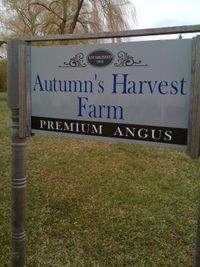 By Evan Dawson, Finger Lakes Correspondent
By Evan Dawson, Finger Lakes Correspondent
Let me start by saying that I love animals, but I also love to eat them.
I appreciate the dichotomy of finding cows lovable and delicious. I am nauseated by the horrific treatment of cows, pigs and chickens, among other animals, but it's always been easiest to simply not think about such treatment.
This week that abrogation of duty ended for me.
On a crisp but sunny afternoon I drove down to Romulus (located between Seneca and Cayuga lakes) to meet Tim Haws, the farmer and owner of Autumn's Harvest Farm. It was not a convenient time for Tim, as he was juggling myriad duties on the farm (cows getting ready to give birth and food needing to be delivered to local restaurants, for example) and myriad duties in the small house connected to some of his 77 acres (taking care of his 18-month old son and 3-month old daughter, for example). And yet Tim had encouraged me to come down and see the animals, so I did.
I had discovered Autumn's Harvest Farm on EatWild.com, a wonderful resource devoted to linking consumers to grass-fed beef, pastured eggs, etc. And yet I confess that I still harbored doubts. A stunning majority of food sold in grocery stores (even stores like Whole Foods) does not boast an origin that matches the flowery stories printed on the labels. American farmers struggle to survive if they do not adopt an industrialized model — the government, and the USDA in particular, favors larger producers and subsidize the operations that submit to this model. I have not met many farmers who have refused to submit to this scheme.
And then I met Tim Haws. A teddy bear of a man, Tim greeted me and welcomed me into his kitchen while his father, a retired former employee of the city of Geneva, watched over Tim's son Ty. We talked a bit about Tim's farming practices, and here are some of the things he said:
"Our animals are happy. Believe me, that matters."
"We rotate our cows at least once a day, and sometimes twice. They're so smart. They not only know they're going to be moved, they get excited about the new grasses."
"Cows are not supposed to eat corn. And don't believe they're only eating corn on those huge farms. They get fed dried bubble gum and all kinds of trash. That's disgusting, and then you think about eating that cow that was eating that stuff."
This was not a sell job. He did not have a set shtick designed to placate consumers who want to eat some Elysian version of "organic." He was just plain-spoken and he was, no doubt, speaking my language.
I was already sold on Tim's practices, and I was deeply enjoying having the chance to meet his family. I offered to write the check for the food I was buying (a 14-pound ham and a pair of steaks - Tim threw in some extras as a gift), and I wanted to get out if his hair. His father, who takes care of a lot of the delivery, was getting ready to head out to Red Newt Bistro and several places — Autumn's Harvest provides beef and pork to Red Newt, Simply Red at Sheldrake Point, and a handful of other restaurants. But Tim didn't want me to leave before I met some of the animals.
We took a nice walk around the property and said hello to some of the heritage pigs and cows who were lazily chomping away at the grass. Tim showed me one of the portable pens that allows chickens to move around on the grass — real, actual free range! — and he continued to cheerfully talk about the benefits of animals eating grass. "Chickens don't only eat grass," he said, smiling. "They love to follow the cows and dig through the cow droppings to find the bugs. We don't ever have to spray - the chickens do so much work!"
It was, to be sure, a mirror image of the philosophy espoused by the now-famous Joel Salatin in Michael Pollan's brilliant book, The Omnivore's Dilemma. And yet I had never mentioned Salatin or Pollan or the book. Tim was leading me around, sharing his own ideas, and it only reinforced the importance of grass-fed animals.
At the risk of sounding condescending, I can't urge you strongly enough to go meet your farmer. I will make a strong effort to never buy corn-fed beef again unless there are no other options. If we could see the way most of the animals that we eat are treated, we'd find those farmers and ask them how in the world our food system ever devolved into this madness. And then if we could meet people like Tim Haws, we'd be inspired that it can change.
There are other grass-fed farms in the Finger Lakes and Long Island — and across the state and country. Check out EatWild.com to find them. And share your stories in the comments.
Before I left I asked Tim and his father if I could come back later this year and volunteer for a day. Tim laughed, and his father said, "You better be ready to get dirty!" I am ready indeed, though I know that "dirty" at Autumn's Harvest Farm carries an entirely different meaning than dirty at an industrialized facility.
